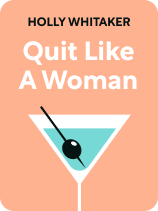

This article is an excerpt from the Shortform book guide to "Quit Like a Woman" by Holly Whitaker. Shortform has the world's best summaries and analyses of books you should be reading.
Like this article? Sign up for a free trial here.
Do you want to live a sober lifestyle? What can you do to keep yourself from drinking?
If you or someone you know have an addiction to alcohol, Holly Whitaker’s book Quit Like a Woman suggests setting up a long-term lifestyle that makes you happy. This lifestyle also protects you from people and things that could trigger addictive behavior.
Let’s look at the five parts of living this ideal sober lifestyle.
Part 1: Put Yourself First
Whitaker insists that to live a sober lifestyle, you always put yourself first to ensure you’re giving yourself the support you need. Stop trying to constantly please others (for instance, by responding immediately to all messages or doing someone else’s work for them) because this depletes your energy and erodes your sense of self—two things you need to stay healthy.
(Shortform note: Putting yourself first can feel nearly impossible, which is why it might help to recruit a personal supporter whose goal is to encourage you to prioritize yourself. You can check in with that supporter before you have a difficult conversation with a friend or loved one about your needs. Even after having a difficult conversation, your supporter can remind you how necessary it was to put yourself first in that scenario.)
Instead, set up boundaries that define what you are and are not willing to do for others, writes Whitaker. Sticking to those boundaries means you’ll likely need to start saying “no” a lot. You may feel guilty about this at first, but after a while, both you and those around you will adjust to your boundaries (and those that don’t will leave, to both your benefit).
(Shortform note: In Codependent No More, Melody Beattie provides another reason you need firm boundaries: When you let people get away with behavior you don’t like for too long, you eventually become so upset and anxious about it that you stop tolerating behavior you’d normally find acceptable. You might thus alienate people who want to help and support you but just don’t know your boundaries yet.)
Part 2: Assemble a Set of Tools for Coping With Low Moments
Create a set of 10 healthy coping strategies that help you when you’re feeling down, recommends Whitaker. These can be activities (like yoga and exercise), objects (like comfortable clothes and blankets), or foods (like teas or chocolates). Having these go-to coping strategies enables you to heal yourself without the use of addictive substances.
(Shortform note: Beyond these self-administered coping strategies, it’s likely also advisable to regularly see a therapist. This is because a therapy session gives you the chance to get to the root of your negative thoughts and feelings, rather than simply treating the symptoms with yoga or tea. Further, if you don’t know where to start in assembling a set of self-administered coping tools, a therapist can give you ideas and help you implement them.)
Part 3: Take Care of Your Health
To maintain a healthy lifestyle over the long term, follow the simple, conventional guidelines for healthy living, writes Whitaker: Eat well, sleep well, drink plenty of water, and exercise regularly.
(Shortform note: Tending to your physical health is particularly important in recovery because addictive substances can wreak havoc on your body—for instance, by creating gastrointestinal problems and nutritional deficiencies. You’ll need to treat your body well to first heal any damage and then to thrive in the long term.)
Part 4: Fill Your Life With Other Forms of Fun
Find forms of fun to replace the old, self-destructive ways you had fun, recommends Whitaker. These can be “normal” activities, just without the addictive substance (eating out, going to museums, picnics), childish activities (visiting a theme park, bouncing on a trampoline, goofing around with friends), or spending quality time alone (with a good book, show, or craft).
(Shortform note: In The Happiness Project, Gretchen Rubin provides advice on how to find activities that will be genuinely fun for you. She first suggests listing activities you currently consider “fun” and asking yourself if they really are enjoyable for you. Then, stop doing anything that’s not actually fun. Additionally, as Whitaker proposes, consider how you used to have fun as a kid, and ask yourself if you can take up any of those activities now.)
Part 5: Engage Constructively With Cravings When They Arise
Whitaker asserts that cravings will arise but that you can cope with a craving by 1) accepting it, 2) ignoring the negative narratives you’ve woven around the craving (such as the belief that you can never resist cravings, that cravings mean you’re weak, and so on), 3) exploring the physical sensations of the craving—for instance a tightness in your chest, clenched fists, or other physical changes, and 4) waiting the craving out by not acting on it.
(Shortform note: In The Willpower Instinct, Kelly McGonigal provides additional context on why we get cravings and why they’re so hard to ignore. She attributes cravings to a psychological phenomenon called ironic rebound: The more you try not to think about something, the more you think about it. Thus, the more you try not to think about having a drink, the more you want the drink—you crave it. McGonigal’s approach to dealing with cravings aligns with Whitaker’s: Because trying to ignore a craving only makes you obsess over it more, it’s more effective to accept the craving and ride it out without acting on it.)

———End of Preview———
Like what you just read? Read the rest of the world's best book summary and analysis of Holly Whitaker's "Quit Like a Woman" at Shortform.
Here's what you'll find in our full Quit Like a Woman summary:
- Why society misunderstands what alcohol addiction is, what causes it, and how to treat it
- Why alcohol is always bad for you, even in moderation
- A feminine, holistic approach to recovery and sobriety






